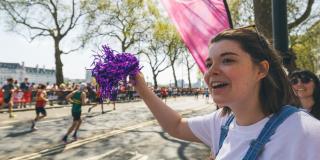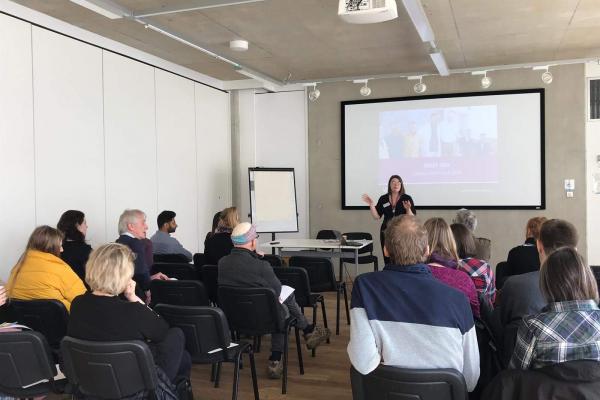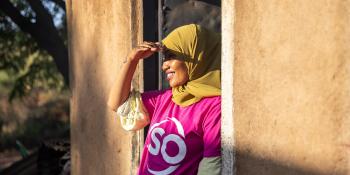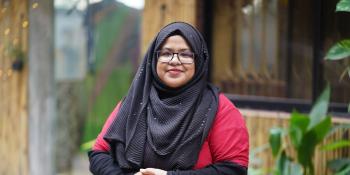
Meet Grace, VSO's Learning and Development Specialist who has worked at VSO for five years. Grace talks about why VSO is a learning organisation and how being reflective on its practices and putting people first is the core of VSO's volunteering for development approach.
What inspired you to work in the development sector?

I completed my undergraduate degree in human geography, which had a strong focus on Development Studies. I chose every module related to development as part of my degree, which allowed me to study the history and theory of development more broadly.
It was ingrained with me and my siblings from a young age that we should try and work for an ethical organisation. I knew I wanted to work somewhere that had a global remit and brought together different people from different places with different experiences and backgrounds that I'd be able to collaborate with and learn from.
When I was at university, I took part in the International Citizen Service (ICS) youth volunteering scheme, and spent three months in Zimbabwe as part of a part of that programme and got a bit of exposure whilst I was there to how a development partner organisation operates. This only really reinforced my desire to work in the charity sector and specifically for a development organisation.
How long you've been with VSO?
I've been here just over five years. I started in September 2017. Feels like a very long time ago now. After I finished my degree, I moved to China to teach with the British Council and then on moving back to London, I started working at VSO so it was my first post university job.
What was the biggest learning curve while working at VSO?
I think I'm still in my learning curve! I'm not sure I will ever escape it. That's probably partly because I'm a learning practitioner, but also the context in which we work is so dynamic and ever changing.
I think perhaps that's one of the biggest challenges too that the landscape is ever changing. The current political and economic climate also poses new challenges all the time to the development sector specifically and to us as individuals personally, I suppose as well. I can't not mention the pandemic. Managing a team of people through the pandemic was a steep learning curve and that balance of trying to look after your own wellbeing whilst also supporting team members at such an unprecedented time was a huge challenge, especially as I'd only stepped into a management role about two months before the pandemic began.
Overall I still feel like I'm very much in the middle of that curve and hopefully decades away from reaching the end!
What's your role at VSO?
I'm the Learning Manager that focuses on supporting our global portfolio of programmes across our practice area networks. My role is to design and develop learning solutions, hopefully effective learning solutions for staff and volunteers across the VSO network.
This could include developing and delivering capacity building or learning plans. It could be supporting with the facilitation of workshops or webinars. It could be advising on how to make meetings and events more engaging or building new online learning modules.
It can be quite wide ranging. And really, my priorities are ensuring that the learning solutions we have are inclusive, accessible, and useful for people. In an age of such information overload, I think it's increasingly important that we're intentional and focused on what it is that people need to learn and then what is the best way of facilitating that learning and so that's my sort of focus in priority generally across my role.
What it was like to have moved through three quite different departments at VSO?

I've worked in five roles in five years! I joined VSO as a Supporter Care Coordinator, sat within the Supporter Care Team, which is a UK-based team that is responsible for responding to all the general inquiries from the public.
I'd also be involved in fundraising processing, so processing monetary donations coming through the post. I remember lots of spreadsheets and financial documents that we have to process. After being in my role for four months the team's remit was expanded to include community fundraising such as challenging events. If we had people that wanted to run on the marathon for example, then we'd have the responsibility of stewarding that relationship and supporting them with their fundraising.
We were given sort of a small number of marathon runners that we would support and have regular check ins with to see how well they were doing with their fundraising. My time in Supporter Care came to about nine months in total. The biggest thing I learnt was a good understanding of the landscape of VSO organisation because we had to be able to triage and redirect all the different inquiries that that came into one central point.
I got a solid understanding of how teams connected. I got to build relationships with a whole different host of people across the organisation as I would pass emails on to them, and acquire a good understanding of processes, especially how volunteering worked, what volunteering opportunities were available and what fundraising was happening in the organisation. It gave me a good platform and a good foundation or knowledge that I've drawn upon ever since in fact.
After Supporter Care Team I moved into the Resourcing team, my first role in the Resourcing team was as the Induction Sourcing and Events advisor. I have the responsibility of coordinating and delivering inductions for international volunteers that we were being sent overseas, based across Europe and the Americas. I worked quite closely with the Netherlands team that would also include delivering face to face training. At that time, we had three-day pre-departure face-to-face training, but I would support the delivery and development of new online modules that they were to complete.
The sourcing part of that role involved attending conferences and exhibiting at conferences to attract new talent into the organisation and to build brand awareness around VSO, so it was all about trying to target and find the skilled people that we needed for the different types of roles. I was attending various events, like an education conference, or a conference for midwives on neonatal nurses to raise the profile of VSO and encourage some of those skilled people to apply for the roles that we had.
We would also sometimes hold specific meet VSO events where we had the opportunity to engage with people externally and help them understand a bit more about the organisation. I learnt a lot such as: using assessment methodologies, how to run the selection, activities for new volunteers, how to work with different types of volunteers, how to engage people at conferences and support them to interact and understand VSO.
I then moved internally within that team up to the team leader role. I was a Resourcing Team Leader for about two years. In that role, I was managing the team of people whose responsibility was to recruit volunteers and employees across Europe. It was the first time I've managed a team. The pandemic hit about two months after.
The main thing I learn at this time was how to manage a team through significant change, how to have difficult conversations, how to deliver bad news, how to work with uncertainty, but also how end to end recruitment worked and how to deliver the good candidate journey, how to support and mentor team members, and to improve their own skills and capacity around recruitment.
How do you think this experience changed you and built your capacity as a leader?

I think it built my personal resilience. I think often a really challenging part of work, especially when we're working from home, is where personal and professional overlap in a way that they've never overlapped before. It's not appropriate anymore to ignore the personal aspects of somebody's life when they're at work. As a leader or as a manager, you must take on all of that, and to be able to support somebody and hold that space and that recognition, while also representing the interests of the organisation and ensuring that the that ultimately the work that needs to happen is possible and gets done.
It can be quite a difficult balance. I learnt a lot more around the balance between supporting team members and representing their interests and wellbeing, while at the same time as representing an organisation and being accountable and responsible for what your team is supposed to deliver, and how to manage those two things together. It also exposed me to working with sort of more senior managers and senior stakeholders across the organisation which I think is helpful to understand have a better understanding and adhere to strategic direction and vision.
How have your previous roles helped you in your current one?
My current role as a Learning Manager is one of the most interesting roles that I've had, because it brings together my interest in education and teaching from my previous experiences and draws upon all the knowledge that I built across VSO in being able to support others in their learning journeys.
It was a new role and even 10 months in, I still feel like I'm at the beginning of working out what the potential is for this role, what we could what we could achieve.
I think that having that experience in so many different teams and having the experience of delivering workshops and webinars and training so many different people in different places, has built my facilitation skills and experience in a way that means I'm now confident to continue that work with a whole different range of staff and stakeholders that I wouldn't have been confident to do a few years ago.
I've also learned a little bit more about how VSO operates as an organisation and what their culture is which means I'm able to navigate through all of that in a more efficient way and bring together the different people that need to collaborate.
Why do you think functional learning development is critical for VSO?
I do believe VSO is a learning organisation. It's fundamental to what we do! Thinking about the People First principles and the volunteering for development approach, we can only really do achieve that through a process of continuous learning and ensuring we have the right capacity and capabilities in the organisation by developing and strengthening skills.
If we look at a lot of the research that's been coming up more recently, organisations where employees or volunteers take time to learn, have better retention rates. They are more engaged, they feel valued, they feel happier at work. I think it's becoming increasingly important as well as the time goes on.
What new ways are VSO looking to deliver learning and development in the next five years?

We're always looking at innovative ways we can think about learning and development and the past two years, with the massive shift to online working and remote working, has really pushed forward VSOs learning and development.
We are looking at developing a VSO learning curriculum. Having a more defined strategy around what our learning curriculum is and how all the different pieces fit together into one coherent curriculum instead of having randomised standalone modules that pop up a different time that, without sort of that wider infrastructure, more holistic picture looking at it. That's one thing that we're developing.
We also want to support the not just the work of the communities of practice, but more broadly create fewer formal spaces for learning to take place. The community practice is a great example of that, where people are different teams, project teams, different staff members are sharing learnings. They're sharing best practice, they're improving themselves as practitioners, but it's not a formal training opportunity. It's not a formal online course that's taking place but the learning that happens there is relevant and useful. We want to think about how we can foster more of these spaces for learning.
Also, if we think about the online learning piece specifically, it's about improving our ability to build really engaging interactive online learning module, video content that include interactive activities. We thought about how an online learning module can fit into a wider learning pathway that might have other opportunities, like supported webinars or coaching or workshops to try and take a more holistic picture instead of it just being one our tick box online learning module learning done. We're trying to push our thinking and expand it to be more holistic.
How do you think the perceptions of learning development as a function have evolved?

I think that sort of over the past few years the organisation has moved away from perceiving learning as just going on a training course to being much more holistic approach are the combination of coaching, mentoring, on the job support that may be supplemented with some formal training opportunities or webinars.
The shift to that blended learning approach is how it is designed and conceived from the beginning. Instead of it being a happy accident, if you like or realisation somebody completing an online workshop that they haven't been able to apply what they've learned into their role, we're trying to think about the design of that right at the beginning.
It must be the entire design of the learning intervention instead of it coming later. We also have a learning platform called Kaya which is allowing us to maximise the effectiveness of the online learning opportunities that we do have and creating some sense of achievement as well. Now that we have these learning badges that you can, you can achieve and you can share them on LinkedIn profiles, you can share them in other places, they are across industry, so if you earn them, they can be recognised in other places. That's sort of a new way to thinking about how we are celebrating them valuing people putting time and energy into learning and how are we recognising that achievement and that investment in professional development.
What does your average day look like?
I always start work at eight o'clock or just before eight o'clock in the morning so I can maximise my working hours with all my colleagues based across the Asia region, and I always finish by about four o'clock in the afternoon. So, my days contain a mixture of could be anything really but meetings workshops, often then doing the tasks I've been assigned to do at the meetings. I could start the day facilitating a global induction webinar with new starters, new employees, and new volunteers. That could be followed by a preparation call for an upcoming community of practice developing a session plan for how that session will run.
I could then spend the afternoon looking at learning methodology of a new online module that we're going to develop updating modules in our learning platform Kaya or running reports to check on completion status is in the feedback. It's usually fairly varied, and I will always try to get out at lunchtime because I work from home alone. It's important that I spend time trying to be outside and connecting with others as much as possible.
How do you find working from home and how do you make it work for you?

I think one of the biggest benefits is that I regained two hours of commuting every day. That is 10 hours a week that I can now put into exercising, into being creative, into volunteering, into seeing friends and family. I think that is one of one of the parts of working from home that I enjoy the most is the extra flexibility it provides.
I'm lucky in that most of the colleagues that I work with the based overseas. So, whether I was in an office environment or working from home, I wouldn't see everyone anyway. And that helps I think a little bit.
However, it’s also important to intentionally schedule time to build social related relationships at work. I think that's sort of one thing when you're working from home when you really aren't seeing people or when you're working completely in a remote environment. Taking the time intentionally to reach out to just catch up with people with just the purpose of checking in with them socially, is really, important, especially then when it comes down to you needing to collaborate with them on something work based.
You have a foundation of a social relationship and trust and understanding that you can that you can build from. I also do a fake commute if it's not raining. That means in the morning and after work getting out the house and just going somewhere. That could be looking to the shop for coffee doing a quick walk at the park. After work it could be doing a quick cycle ride just trying to create that sense of distance between working online. I will always put away all my working things at the end of the day out of sight so that I'm not tempted in the evening to just log back on and have a look at emails or check calendar for the next day. I've become strict about my working hours and setting the difference between working and being not at work.
What brings you joy outside of work?
I do loads of hobbies outside of work. I think my biggest joy means come from a singing in a choir. It gives me a weekly opportunity to get together with basically strangers. I didn't know any of these people before I joined the choir just to come together for a shared love of singing is wonderful.
I love spending time with friends and family and my niece and nephew. I really enjoy spending time with my book club and having that sort of that intellectual stimulation with others, the exposure to different ideas and have opinions challenged. I really enjoy volunteering regularly and making the most of what London has to offer. I've lived here up to 10 years in total and I still feel like I have endless theatres, museums and galleries to go to.
I will make a shameless plug - I joined a London charity softball league the softball league for the first time this summer. VSO has a team in collaboration with a few other organisations, and I have an absolute blast, but there's only two VSO members that are part of the team. I'm always looking to encourage new players to sign up next summer. I haven't mentioned travel, but I would probably put it up there also one of my interests and passions, being outside hiking, what don't I love?
What is one thing that you like the most about your role/work at VSO?
It’s the people - the dedication and the passion of colleagues and volunteers alike. I feel a sense of pride every day to be able to say that I sort of work alongside such talented, dedicated individuals that I've been able to learn so much from. Now I'm in a role where I get to try and support the learning of those people and that is very fulfilling.
Read more
Protecting the biodiversity of the East Tonlé Sap Lake through aquaculture
Aquaculture — the farming of aquatic organisms, such as eels, shellfish, and seaweed, in a controlled environment — is transforming the lives of people like Mr Em Phat, who are living on the East Tonlé Sap Lake in Cambodia.

Five things women achieved this year that you might not know about
This International Women's Day, join us in celebrating the resilience of women across the globe with some female achievements you might not have heard about.

Breaking barriers: Lamia's journey of volunteering, leadership, and gender equity
Bangladesh - Lamia Tasnim's volunteering journey began in 2018, and over the course of the last six years, her passion for supporting her community has only grown.
